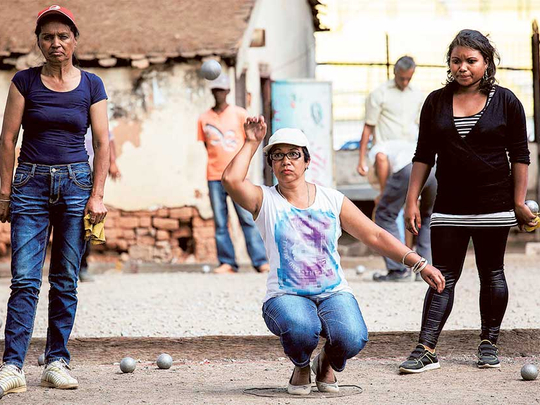
ANTANANARIVO: It’s not even midday in the middle of the work week, but already the clacking of steel balls colliding on a makeshift pitch rings out in Madagascar’s capital, Antananarivo.
Curious bystanders watch as players swing their arms, releasing the balls in gentle arcs while avoiding a large tree root protruding from the square pitch.
This is petanque, a form of boules or bowling beloved across the Indian Ocean island nation.
And with Madagascar recently crowned world champions, the country’s passion for the sport has reached fever pitch — at any time of the day.
“Petanque is very, very important. It’s everything to us,” says Andry Maminirina, who built the field next to the majestic Lake Anosy three years ago.
Across the lake, at the foot of a hill where ‘Antananarivo’ is spelt out like the Hollywood sign, several games are well under way at the Tana Bowls Club (TBC).
Tree roots are not a problem here, and about a hundred players — men and women, young and old — fill the well-maintained fields.
Originating in the south of France, the goal of petanque is for players to toss their balls as close as possible to a smaller wooden ball called a ‘cochonnet’ or jack.
When the French colonised Madagascar, they brought petanque with them.
“I played petanque for the first time in 1964 when I was in the French army,” said Clet Ramamonjisoa, 75, an amateur player.
But getting hold of the necessary equipment to train with is a challenge. Players rely on second-hand balls sent over by family members that have emigrated to Europe.
“We don’t have much opportunity to get equipment here — even just the balls, you can’t get them in Madagascar. If you do find a pair, they’re usually very expensive,” said Michel Ranarivelo, another amateur player.
Petanque fever was soaring when in late November the world championship was just a week away — and Madagascar was the host country.
It would be the island’s first time hosting a championship in any sport, ever.
Madagascar has no more than 20 professional petanque players, but in 1999 it took gold and has racked up an impressive list of second places since then.
“Petanque here in Madagascar is like football in Brazil,” said Beryl Razafindrainony, president of Madagascar’s petanque federation. “At first it was just a leisure activity, but the 1999 victory really popularised it across the country.”
But at TBC, many players mentioned rumours of “corruption” at the highest levels of the sport.
Madasgacar’s slew of silver medals sparked allegations of match fixing and that the island’s team was throwing finals for bribes worth thousands of euros (dollars) — an astronomical amount in a country where the average salary is just 45 euros a month.
This year, the national team was housed in a top secret location, their cell phones confiscated and all communication with their families cut off.
“There will always be ill-intentioned people to cause trouble with our players,” said Razafindrainony.
“The players feel motivated and I don’t think they would be influenced by any sum of money. But the suspicion was still there and so to avoid all that we decided to remove them from society.”
Whether the suspicions were fair or not, the move worked.
When France — the undisputed champ since 2001 — was knocked out in the semi-final, Madagascar grabbed the opportunity to take back their crown.
In a final more akin to a football match, the crowd whooping and cheering, Madagascar crushed Benin 13-5.
Seventeen years after the title that started petanque fever in Madagascar, the island’s enthusiasm for the sport is greater than ever.
— AFP












